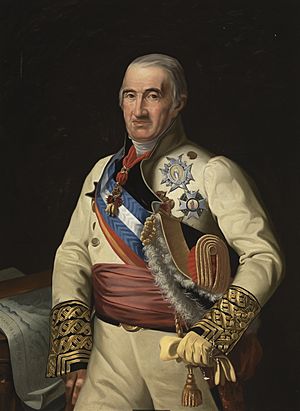Francisco Javier Castaños, 1st Duke of Bailén facts for kids
Quick facts for kids
The Most Excellent
Francisco Javier Castaños
|
|
|---|---|

Castaños (c. 1830) wearing the uniform of the Africa Regiment with the Order of the Golden Fleece and the Grand Cross and band of the Order of Charles III and the Laureate Cross of Saint Ferdinand and band.
|
|
| President of the Regency Council | |
| The Duke of Bailén | |
| In office 1 February 1810 – 29 May 1810 |
|
| Monarch | Fernando VII |
| Preceded by | Office established |
| Succeeded by | Pedro de Quevedo y Quintano |
| 1st Speaker of the House of Peers | |
| In office 10 April 1834 – 12 July 1835 |
|
| Preceded by | Office established |
| Succeeded by | The Duke of Ahumada |
| Personal details | |
| Born |
Francisco Javier Castaños Aragorri
22 April 1758 Madrid, Spain |
| Died | 22 April 1852 (aged 93) Madrid, Spain |
| Resting place | Pantheon of Illustrious Men (1852–1963) Parish Church of the Incarnation, Bailén (1963–present) |
| Profession | Army general and politician |
| Awards | Knight of the Order of the Golden Fleece Grand Cross of the Order of Charles III |
| Military service | |
| Allegiance | |
| Branch/service | Spanish Army |
| Years of service | 1774–1852 |
| Rank | Captain general |
| Battles/wars | War of the Pyrenees Anglo-Spanish War (1796–1808) Napoleonic Wars Peninsular War |
Francisco Javier Castaños Aragorri, 1st Duke of Bailén (22 April 1758 – 24 September 1852) was a Spanish general and politician who excelled during the French Revolutionary Wars and the Napoleonic Wars. From July to September 1834, he served as the first president of the Senate of Spain, at that time called the House of Peers.
Castaños was one of the most important military officers during the Peninsular War, presiding the Regency Council of Spain and the Indies, (de facto head of state), in 1810. In 1833, Queen Regent Maria Christina of the Two Sicilies, in the name of her daughter, Queen Isabella II, granted him the title of Duke of Bailén, to honour his actions during the Peninsular War and, especially, at the Battle of Bailén, where the Napoleonic army was defeated in the open field for the first time and which led to King Joseph having to abandon Madrid at the end of that same month.
Castaños is remembered for his victory over the French under Dupont, whom he surrounded and compelled to surrender at the decisive Battle of Bailen in 1808. Just months later he led his army to a decisive defeat at the Battle of Tudela. After this he served under Wellington in several engagements, and was commander of the Spanish army, if required, to invade France in 1815.
Biography
Early career
He was promoted, in October 1802, to lieutenant general in the same promotion as other notable Spanish military commanders of the Spanish armies during the Peninsular War, including the Duke of the Infantado, Manuel Lapeña, Juan Carrafa, Juan Pignatelli, Francisco Taranco, Francisco Eguía, and Arturo O'Neill, among others.
Peninsular War
Post-war career
Following Napoleon's flight from Elba, and the start of the Hundred Days, Castaños was given command of the Army of Observation of the Right and crossed into Roussillon. With Napoleon defeated at Waterloo, Castaños was appointed captain general of Catalonia.
In 1837 he was appointed senator for the province of Barcelona, seat he held until 1845, apart from the period 1841–1844. In 1845 he was appointed senator for life.
Castaños died in Madrid in 1852. Isabella II attended the funeral service and her husband, the king consort Francisco de Asís, Duke of Cádiz accompanied the coffin from San Isidro el Real to Nuestra Señora de Atocha, where the Duke was entombed.
See also
 In Spanish: Francisco Javier Castaños para niños
In Spanish: Francisco Javier Castaños para niños


